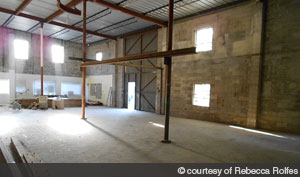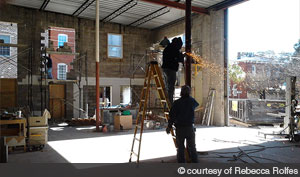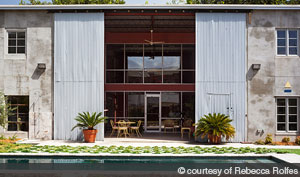Michael Close and Rebecca Rolfes found their dream home in a vacant warehouse. The barebones, two-story block structure in Savannah, Ga. — which they bought for $421,000 — didn’t have any of the trappings of a typical high-end property. It was stripped down to its concrete base, and the lot was nothing but dirt. But the couple had a vision for what it could be.


Close and Rolfes, a sculptor and a journalist, respectively, saw the warehouse as a blank canvas that could inspire their creative spirits. Over about four months, they spent $300,000 turning it into a stunning 6,000-square-foot, open-layout home with a first-floor sculpture gallery, indoor atrium with internal windows and garden, and an expansive library of 1,000 books.

Their real estate agent, Kim Iocovozzi, a sales associate with Judge Realty in Savannah, took a while to see their vision. “I didn’t see anything but trouble,” he admits. “But they knew what they wanted.”
The experience taught Iocovozzi to be more flexible when working with buyers who can afford to live however they want. Many buyers are casting aside the traditional notion of a luxury home in favor of something personal, creative, and supportive of their lifestyle, and real estate professionals who want to serve luxury buyers must be able to see opportunities in unconventional parts of the market.
“As a real estate agent, you have to be diverse,” Iocovozzi says. “I’ve seen 19th Century storefronts turned into a hybrid of work and living spaces. … [These buyers] could have an Arts and Crafts bungalow, a historic renovation, a mansion along the river, or a 200-acre farm.”
Because luxury is in the eye of the beholder — it can be a 1,000-square-foot apartment souped up with the latest smart-home technology or a waterfront mansion — you have to know many different markets. If you focus on a particular niche or neighborhood, your expertise may be too narrow to be meaningful to luxury buyers who are considering several options, says Craig Hogan, vice president of luxury marketing at Coldwell Banker.
“There’s a large group of luxury buyers who may choose something that is far off from what traditional buyers choose,” Hogan says. “If you’re not familiar with new construction because you’ve always been a resale agent, that’ll kill you. Or if all you know is new construction and you have a market in your area that’s filled with beautiful brownstones, you better know that, too. You can’t focus on the tiny sliver of the market you’re comfortable in.”
If you’re not confident in your knowledge about other neighborhoods and property types, how do you break out of your niche? Michael Nourmand, president of Nourmand & Associates in Beverly Hills, Calif., says many of his high-end clients search 10 neighborhoods or more. He suggests asking agents who work in high price points to show you around the different properties they sell. They can teach you what’s on the market in different areas and why they’re priced the way they are. That’s important to know when the difference between two homes could be as much as $1 million.
“In my market, a city view with an ocean background versus a roofline view can be the difference in what’s considered luxury,” he says. “Relationships with other agents who can tell you these things are very important. When you’re dealing with people buying homes for that much money, they’re more educated than you think, and you need to know more than the client does.”
Sherry Chris, CEO of Better Homes and Gardens Real Estate, suggests attending high-end functions in your area where you can connect with creative types in luxury real estate, such as contractors, architects, and designers. They can keep you abreast of hyperlocal trends in different areas that influence luxury buyers’ decisions, and they can be useful resources for your clients. Because many buyers like to create their own personal idea of a luxury home, as Iocovozzi’s clients did, they’ll turn to you for advice on who to contact to get the project started.
But you need to have professionals you know well already on hand when the need for your client arises. That means forming relationships ahead of time. “The days are gone when agents could tell their clients to go online and find what they’re looking for, whether that be a repairman, appliance guys, or housekeeping,” Hogan says. “You have to have a selection of people they can work with, and these have to be solid, vetted relationships you’ve formed.
Want to break into your luxury market? Hogan offers three tips for agents to prepare for working with luxury buyers in the video below.




